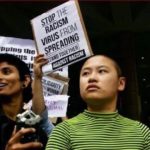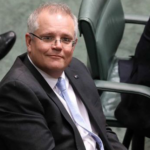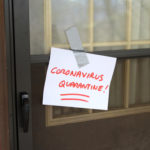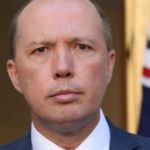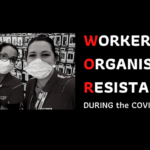Morrison’s Mixed Messages on the Coronavirus
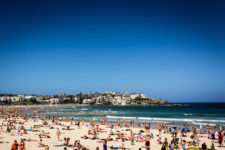
The Morrison Government recently introduced a range of measures and restrictions on the Australian public, as Coronavirus infections continue to rise.
Some of these new rules include:
- Non-essential gatherings of more than 100 people are forbidden
- Pubs, clubs, sporting and religious venues are closed
- Restaurants and cafes will only be allowed to offer takeaway services.
- No more than one person per four square metres in a room, including outdoor events
- In addition, we’re all to practice, wherever possible the 1-metre or 1.5-metre distance between each of us.
- Hand hygiene products must be made available in all venues
- Restricted travel into remote Indigenous communities
- All non essential domestic travel should be avoided
- Visits to prisoners being reviewed.
No doubt there are more to come, and of course the federal and state governments are well within their rights to impose these measures in the face of a pandemic. A lot has been said about personal space, with people encouraged to stay home as much as possible and keep away from each other in shared spaces.
The result of the harsher crackdowns were a direct response to footage of Sydney-siders taking advantage of a beautifully warm autumn day and ignoring the ‘self-distancing’ recommendations, at Bondi Beach and cafes and restaurants. The Government reacted harshly, moving to close beaches. Effective immediately. This will be enforced by lifeguards and police. That said, the rule is hazy at best, considering it was originally intended that Bondi would only be open to 500 people at a time.
All of this is, of course, designed to ensure that we are limiting potential opportunities for the spread of the virus.
Did the Government act swiftly enough?
But in recent weeks a number of health experts have slammed the Morrison Government for not acting more swiftly on Coronavirus. They believe that if the government had made essential quarantine decisions earlier, we could potentially have substantially curtailed the rise in the number of infections. They’ve also criticised the ‘mixed messages’ coming from our leaders.
One such expert is Bill Bowtell, an adjunct professor at the Kirby Institute for infection and immunity at the University of New South Wales. He designed Australia’s world-leading response to the AIDS epidemic several decades ago. More recently, he worked for 15 years with the Global Fund to Fight AIDS, Tuberculosis and Malaria.
He says the Government knew about the severity of Coronavirus 12 weeks ago, and at that time should have accumulated testing kits, brought in necessary emergency equipment and medical supplies, provided money for science and vaccine research and immediately begun a public educational campaign.
He points to the swift decision-making of a handful of nations – South Korea, Japan, Taiwan, Hong Kong – that responded early and decisively and have succeeded in flattening the curve of infections, if not stopping the spread of Covid-19 almost completely.
For example, in China, just three weeks after the World Health Organisation and Wuhan health authorities were alert to the appearance of a new disease, the Chinese government ordered what has been called the largest quarantine in history. As a result, four months later, the country us beginning to move on from the threat of Coronavirus.
Instead, Australia’s response has been similar to the approaches taken in Europe and America, where cases have been, and still are, growing exponentially.
Impending strain on the health system
Now, as more Australians test positive for the virus, in the weeks and months ahead we’re likely to see an incredible strain on our already stretched health system. OECD data shows us well down the list on the number of hospital beds: 3.8 per 1000 population. That is about the same as Norway, a little ahead of Italy and Spain, but way behind Japan and Korea, which have nearly four times as many. Even China has more.
The Australian Medical Association (AMA) is seriously concerned that face masks, and other protective supplies are at an alarming shortage for medical staff, and many staff are fearful they have not had the appropriate training to deal with patients who have the virus.
There are questions whether the recent Federal Government pledge of $2.4 billion to the health sector is actually going to be enough.
Mixed messages
The Australian Medical Association (AMA) has also been critical of the mixed messages that have been given to all Australians, too.
At a press conference in February Scott Morrison assured Australians: “There is no need for us to be moving towards not having mass gatherings of people. You can still go to the football, you can still go to the cricket … You can go off to the concert, and you can go out for a Chinese meal. You can do all of these things because Australia has acted quickly.”
More recently he said he was going to watch his beloved Cronulla Sharks – a decision that was reversed just hours later.
Only last week Chief Medical Officer, Brendan Murphy, said people should practise social distancing with recently returned travellers and / or people known to have come into contact with the virus, but that it was otherwise permissible to be close and shake hands. That advice too, has since been changed.
More alarmingly, on the same day Bondi Beach was ordered closed, the government allowed 2,700 people to walk off a cruise ship in Sydney’s CBD which had reported more than 150 illnesses. At least five people from the Ruby Princess have since tested positive to Covid-19, some of whom boarded domestic flights home.
The AMA in Western Australia is also calling for state borders to be shut. New South Wales and Victoria are said to be in discussions about whether or not to draw a line, and the NT has already effectively done so – enforcing anyone who enters the Territory into strict quarantine.
So what happens now?
Even though the Government has certainly flexed its muscle in terms of enforcing a range of new rules and regulations, there’s still a remarkable lack of ‘leadership’ at this critical time. If social media is any gauge, by and large, people are polarised when it comes to what they believe and how we should react to Coronavirus.
But we are facing two truths:
- Cases of Coronavirus are on the rise.
- There’s still an overwhelming amount of mis-information in the media and public domain about how to avoid contracting it and what to expect if we do.
As of 21 March, in Australia there are more than 1,000 confirmed cases – and by State, NSW has the highest number of infections – 461. There have been 7 deaths. While the mortality rate remains low, the concern has always been Coronavirus will severely impact people who are elderly, frail, or have pre-existing health conditions.


